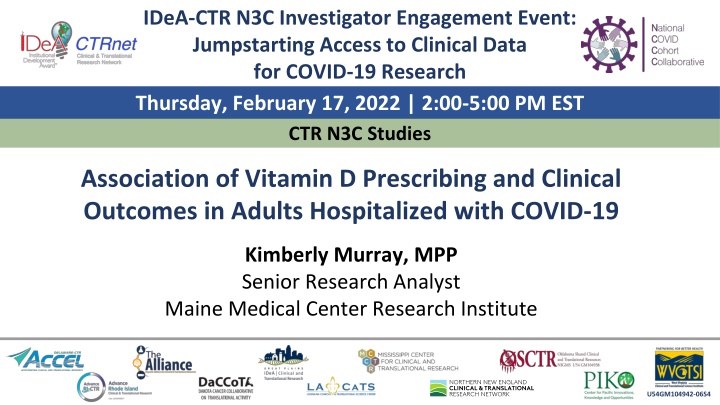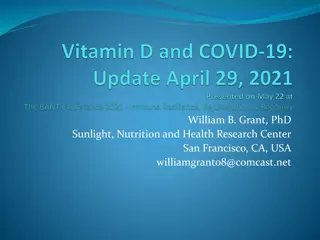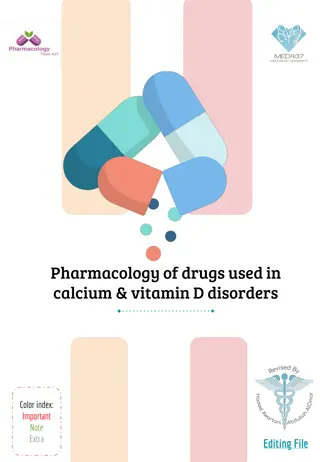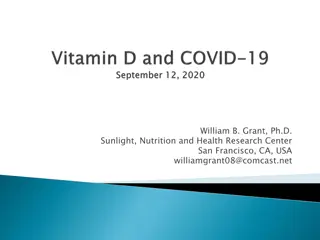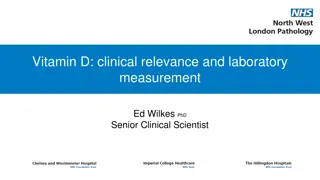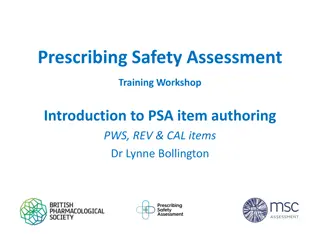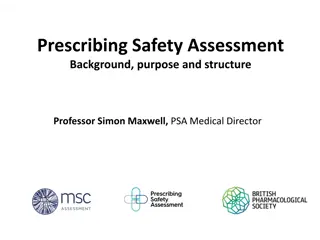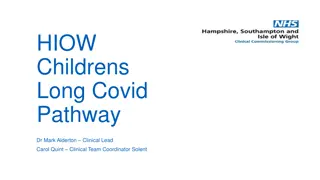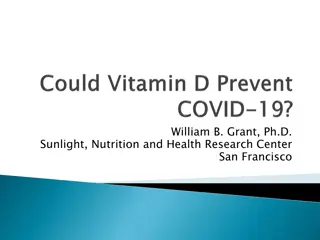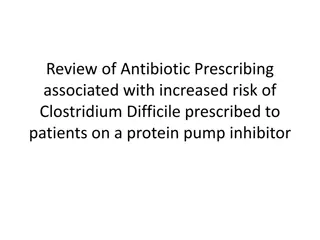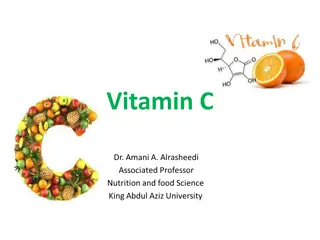Association of Vitamin D Prescribing with Clinical Outcomes in COVID-19 Hospitalized Adults
Investigating the impact of Vitamin D prescribing on clinical outcomes in adults hospitalized with COVID-19, this study analyzes the association between Vitamin D treatment and patient outcomes such as mortality, length of stay, and need for ventilation. The research explores the complex effects of Vitamin D on immunity and aims to provide insights into potential benefits for COVID-19 patients. Results show variations in Vitamin D prescription rates by age, time of hospital admission, and comorbidity index, shedding light on the potential role of Vitamin D in managing COVID-19 patients.
Uploaded on Sep 16, 2024 | 1 Views
Download Presentation

Please find below an Image/Link to download the presentation.
The content on the website is provided AS IS for your information and personal use only. It may not be sold, licensed, or shared on other websites without obtaining consent from the author.If you encounter any issues during the download, it is possible that the publisher has removed the file from their server.
You are allowed to download the files provided on this website for personal or commercial use, subject to the condition that they are used lawfully. All files are the property of their respective owners.
The content on the website is provided AS IS for your information and personal use only. It may not be sold, licensed, or shared on other websites without obtaining consent from the author.
E N D
Presentation Transcript
IDeA-CTR N3C Investigator Engagement Event: Jumpstarting Access to Clinical Data for COVID-19 Research Thursday, February 17, 2022 | 2:00-5:00 PM EST CTR N3C Studies Association of Vitamin D Prescribing and Clinical Outcomes in Adults Hospitalized with COVID-19 Kimberly Murray, MPP Senior Research Analyst Maine Medical Center Research Institute U54GM104942-06S4
Association of Vitamin D Prescribing Association of Vitamin D Prescribing and Clinical Outcomes in Adults and Clinical Outcomes in Adults Hospitalized with COVID Hospitalized with COVID- -19 19 ISCORE ISCORE Kim Murray, MPP Kathleen M. Fairfield, MD, DrPH Jerrod Anzalone, MS Will Beasley, PhD Maryam Khodaverdi, MS Sally Hodder, MD Jeremy Harper, MS Susan Santangelo, ScD Clifford J. Rosen, MD IDeA States Consortium for Clinical Research February 17, 2022
Background Objectives Vitamin D is known to have complex effects on immunity including: activating innate immunity in an autocrine manner reduces the overactive immune response, which may be relevant in the cytokine storm observed in severe infections Vitamin D deficiency is associated with auto-immunity Smaller studies examining the relationship between clinical outcomes from COVID-19 and vitamin D have produced variable results, although larger clinical trials are pending To examine the relationship between Vitamin D treatment on three COVID-19 outcomes: 1. Death or referral to hospice 2. Length of stay greater than 5 days 3. Mechanical Ventilation or ECMO Methods 158,900 adult patients hospitalized for COVID-19 Jan 1, 2020 July 31, 2021 Vitamin D prescribing was identified using all available names for vitamin D and its derivatives. Patient characteristics were examined in relationship to vitamin D receipt, including age, sex, race, BMI, and Charlson Comorbidity Index, and rural or urban residence (using RUCA codes) ISCORE ISCORE IDeA States Consortium for Clinical Research
Results Percentage of COVID+ Hospitalized Patients Prescribed Vitamin D by Age A B Percentage of Patients Prescribed Vitamin D by Quarter/Year of Hospital Admission 25% 25% 20% 21% 21% 20% 20% 20% 15% 16% 14% 15% 10% 11% 10% 5% 0% 5% 18-29 30-49 50-64 65-74 75 and older 0% 2020 Q1 2020 Q2 2020 Q3 2020 Q4 2021 Q1 2021 Q2 2021 Q3 Patient Outcomes by Vitamin D Treatment D Percentage of Patients Prescribed Vitamin D by Charlson Comorbidity Index C % Prescribed Vitamin D 30% OUTCOME All Patients 25% Death/Referral to hospice 16903 (11%) 3666 (21%) 20% 15% 10% Length of stay > 5 days 75784 (48%) 17386 (23%) 5% 0% Mechanical Ventilation/ECMO 20428 (13%) 4900 (24%) 0 1 2 3 or more ISCORE ISCORE IDeA States Consortium for Clinical Research
Odds of Study Outcomes According to Treatment of Vitamin D: Full Cohort Results from Multivariable logistic regression models (N=158,900) AOR (95% CI) 1.11 (1.07-1.16) Covariates: Age Sex Race data submitter time period (year/quarter of diagnosis) BMI CCI vitamin D treatment, RUCA code (urban/rural residence) 1.79 (1.74-1.84) 1.50 (1.44-1.56) Adjusted Odds Ratios (95% CI) ISCORE ISCORE IDeA States Consortium for Clinical Research
Odds of Death or Referral to Hospice According to Treatment of Vitamin D: Sub-Analysis AOR (95% CI) Inclusion Criteria for Severe Patients: (N=81,446) 1.11 (1.07-1.16) Death or referral to hospice (N=16,908) 0.90 (0.86-0.94) Length of stay > 5 days (N=75,784) Mechanical ventilation or ECMO (N=20,428) Adjusted Odds Ratios (95% CI) ISCORE ISCORE IDeA States Consortium for Clinical Research
Kaplan-Meier Curves for Patients with Severe Outcomes by Age and Vitamin D Treatment ISCORE ISCORE IDeA States Consortium for Clinical Research
Conclusions Vitamin D was prescribed more frequently to patients who were older or had more comorbidities, suggesting that patients who were doing poorly were more likely to be treated with Vitamin D. We observed an unexpected positive relationship between vitamin D treatment and adverse clinical outcomes including death or referral to hospice, length of stay more than 5 days, and mechanical ventilation or ECMO. But among those patients with severe disease, there was an inverse relationship of Vitamin D treatment and death or referral to hospice. ISCORE ISCORE IDeA States Consortium for Clinical Research
